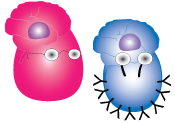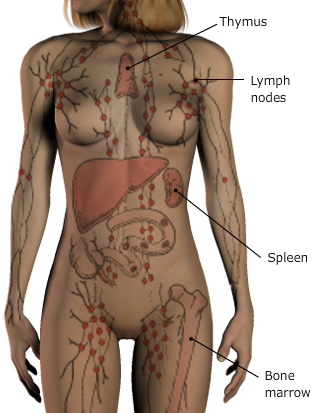
Introduction
Now we know what makes T cells tick, so how about the B cells?
During its life, B cells have at least 3 roles in the adaptive immune response: they are antigen presenting cells, co-stimulators of Th cells and, perhaps most importantly, are the only cells in the body capable of producing antibodies.
B cells are born in the bone marrow (graphic). Here the B cells develop from stem cells to mature B cells, with each developmental stage characterised by a specific set of proteins on their surface. B cells can leave the bone marrow at both the immature and mature stages. The immature B cells then finish off their maturation in secondary lymphoid organs like the spleen and lymph nodes (graphic). These immature B cells express surface bound immunoglobulin of the IgM isotype. Mature B cells on the other hand, express both IgM+ and IgD+.

As the bone marrow is a foreign antigen-free location, all B cells emerging from here are naive, i.e. antigen inexperienced. A B cell remains naïve until it accidentally bumps into an antigen it can bind, which usually happens in secondary lymphoid organs. B cells then pull the antigen:Ig complex inside, chop the antigen up and display fragments in the jaws of MHC class II molecules. This is when B cells function as antigen presenting cells. Who do they present antigen to? Take a look at this video and see if you can find that out. When a B cell finds a Th cell that has had the same antigen presented to it by another antigen presenting cell, the B cell further activates the Th cell to produce cytokines. This interaction and these cytokines cause the B cell to divide and become either antibody producing plasma cells or memory B cells. Whereas the plasma cells migrate to the bone marrow to secrete antibodies, the memory B cells stay in the secondary lymphoid organs in wait for recurrence of the antigen.
Over the next few pages we will be looking more closely at what it takes to get a B cell going, how antibodies are produced, what influences which antibody isotype is produced and what functions antibodies have in the body. You might be surprised to find that the sophisticated adaptive immune system sometimes have some rather basic sides too!